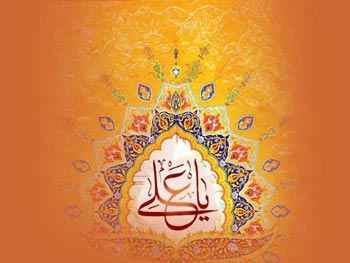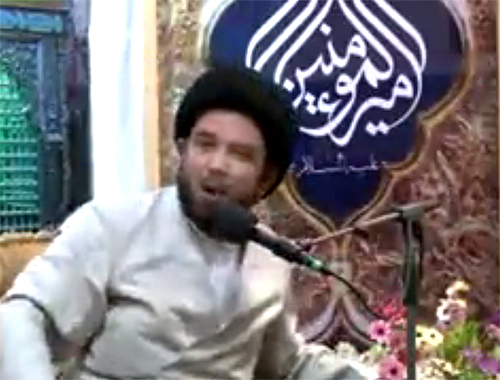Meaning and Implication
- Details
- Hits: 4049

Meaning and Implication
Some commonly asked questions regarding the meaning and implications of the event of Ghadir Khumm, and their responses from a variety of online texts.
How does the word mawla imply authority?
The words, Wala, Walayat, Wilayat, Waly, Mawla, Awla and the like have been derived from the same root, viz. Waly. The various forms of this root-word and its derivatives are the most oft-recurring words in the Holy Qur'an. It is said that they have been used 124 times in the form of a noun and 112 times in the form of a verb.
Master and Mastership, Ayatullah Murtada Mutahhari, Chapter 1
... However some people did try to interpret the tradition in a different way. They particularly tried to translate the words wali (master/guardian), mawla (master/leader), and wilayah (mastery/leadership/guardianship) as friend and friendship.
Shi'a Encyclopedia, Chapter 3: Ghadir Khumm Part (ii) "The Meaning of Wali, Mawla, and Wilayah"
________________________________________
... As the Sunnis cannot deny the authenticity of the hadith of Ghadir, they try to downplay its significance by saying that the word "mawla" in this hadith means 'friend', and that the Holy Prophet wanted to announce that: "Whoever whose friend I am, 'Ali is his friend!"
The trouble is that not a single person who was present in Ghadir grasped this alleged meaning.
Imamate: The Vicegerency of the Prophet, Part II (second half)
________________________________________
Now let us see what the Messenger of God meant by the word "master" (mawla) when he said: "For whomsoever I was his master, 'Ali is now his master." Does it mean one who has prior rights of disposition, as the concomitant of the absolute governance of one person over another, or simply a helper and friend?
Imamate and Leadership, Sayyid Mujtaba Musavi Lari, Chapter 3
________________________________________
Doesn't this hadith relate to when the Prophet [s] addressed some people who had been with 'Ali in Yemen and were unhappy with him on the issue of distribution of booty?
As regarding the pretext they claim, it is nothing but a speculation and an adulteration. It is the sophistry of confusion and embellishment. The Prophet (pbuh) dispatched `Ali to Yemen twice, the first took place in 8 A.H. It was then that scandal¬mongers spread rumours about him, and some people complained about him to the Prophet (pbuh) upon their return to Medina...
Al-Muraja`at, Sayyid Sharaf al-Din Musawi, Letter 58
________________________________________
Wasn't the verse "This day have I perfected for you your religion..." revealed in `Arafah?
Al-Bukhari is reported to have said in his Sahih.... from Tariq ibn Shahab, who said: Some of the Jews said: Had this verse been revealed unto us we would have taken that day as a feast. 'Umar asked them: Which verse you mean? They replied: "This day have I perfected your religion for you and completed My favour unto you, and have chosen for you Islam as a religion." 'Umar said: I know the place where it was revealed. It was revealed while the Messenger of Allah, upon whom be Allah's peace and benediction, was halting at 'Arafat....
With The Truthful, Dr. Muhammad Tijani al-Samawi
________________________________________
How could all the Companions ignore or forget about this event if it implied 'Ali's designation as successor?
Here the following question arises. Given the fact that the Prophet, peace and blessings be upon him and his family, proclaimed 'Ali to be his legatee (wasiyy) and successor (khalifah), emphatically designated him as the leader of the Muslims both at Ghadir Khumm and on other appropriate occasions, how did it happen that after the death of the Most Noble Messenger his Companions (sahabah) ignored God's command and abandoned 'Ali, that noble and precious personage, decided not to obey him, chose someone else to be leader in his place, and entrusted the reins of rule to him?
Imamate and Leadership, Sayyid Mujtaba Musavi Lari, Chapter 7
________________________________________
The important element to complement the research, that is worth mentioning and investigation, may be the sole objection that most often be raised when the obstinates being dumbfounded by irrefutable arguments whereat they resort to wondering and denying that a hundred thousand companions attended the event of nominating al-Imam 'Ali (as a caliph). They all conspired it, opposed and turned away from him, though some of them were the best of companions, and most honourable of the Ummah! I was encountered with such an event in particular when launching my research, as I couldn't believe, nor does anyone, that the issue being laid in this way. But when studying the issue with all its dimensions, no wonder will remain in the minds, as the issue is not the way we imagine or as presented by Ahl al-Sunnah....
With The Truthful, Dr. Muhammad Tijani al-Samawi
________________________________________
If 'Ali was appointed why didn't he use this argument himself?
Some people ask why at the meeting held in the Saqifah 'Ali, peace be upon him, did not raise the issue of his appointment at Ghadir Khumm by the Messenger of God, peace and blessings be upon him and his family, to be his successor. Why, they ask, did he not tell the Migrants and the Helpers that he had been appointed by the Prophet so that nobody had the right to contest the succession with him or to claim the caliphate? Had the thousands of people who had been present at Ghadir Khumm forgotten what they had witnessed?
Imamate and Leadership, Sayyid Mujtaba Musavi Lari, Chapter 4
________________________________________
Could this tradition not be interpreted to indicate that the Prophet's intention was futuristic?
You have, may Allah support the truth through your person, asked us to be convinced that the gist of hadith al¬Ghadir is that `Ali is the most worthy for imamate when and if the Muslims choose him as such and swear the oath of allegiance to him. Hence, his priority to which the hadith hints is futuristic, rather than immediate. In other words, such a priority will take place when and if it is forcibly taken, rather than being actual, so that it does not clash with the caliphate of the three imams who preceded him [in ruling the Muslims]....
Al-Muraja`at, Sayyid Sharaf al-Din Musawi, Letter 58
________________________________________
Isn't this belief of appointment against the principles of democracy and shura?
There are people who think that if government were to originate with the people themselves, with the members of society choosing their own leader from among qualified persons, relying in their choice on their own desires, perceptive capacities and relative knowledge of the strong and weak points of various individuals, this would be more in accord with freedom and democracy and thus enable mankind to attain its highest ideal. They imagine further that if the people are not permitted to have any share in the choice and designation of their leader and if the office of Imam or caliph is not a fully elected one, the people will see in him simply a ruler who has been imposed on them.
Imamate and Leadership, Sayyid Mujtaba Musavi Lari, Chapter 11
________________________________________
Shi'a Encyclopedia, Chapter 3: Ghadir Khumm Part (ii) "The Meaning of Wali, Mawla, and Wilayah"
________________________________________
... As the Sunnis cannot deny the authenticity of the hadith of Ghadir, they try to downplay its significance by saying that the word "mawla" in this hadith means 'friend', and that the Holy Prophet wanted to announce that: "Whoever whose friend I am, 'Ali is his friend!"
The trouble is that not a single person who was present in Ghadir grasped this alleged meaning.
Imamate: The Vicegerency of the Prophet, Part II (second half)
________________________________________
Now let us see what the Messenger of God meant by the word "master" (mawla) when he said: "For whomsoever I was his master, 'Ali is now his master." Does it mean one who has prior rights of disposition, as the concomitant of the absolute governance of one person over another, or simply a helper and friend?
Imamate and Leadership, Sayyid Mujtaba Musavi Lari, Chapter 3
________________________________________
Doesn't this hadith relate to when the Prophet [s] addressed some people who had been with 'Ali in Yemen and were unhappy with him on the issue of distribution of booty?
As regarding the pretext they claim, it is nothing but a speculation and an adulteration. It is the sophistry of confusion and embellishment. The Prophet (pbuh) dispatched `Ali to Yemen twice, the first took place in 8 A.H. It was then that scandal¬mongers spread rumours about him, and some people complained about him to the Prophet (pbuh) upon their return to Medina...
Al-Muraja`at, Sayyid Sharaf al-Din Musawi, Letter 58
________________________________________
Wasn't the verse "This day have I perfected for you your religion..." revealed in `Arafah?
Al-Bukhari is reported to have said in his Sahih.... from Tariq ibn Shahab, who said: Some of the Jews said: Had this verse been revealed unto us we would have taken that day as a feast. 'Umar asked them: Which verse you mean? They replied: "This day have I perfected your religion for you and completed My favour unto you, and have chosen for you Islam as a religion." 'Umar said: I know the place where it was revealed. It was revealed while the Messenger of Allah, upon whom be Allah's peace and benediction, was halting at 'Arafat....
With The Truthful, Dr. Muhammad Tijani al-Samawi
________________________________________
How could all the Companions ignore or forget about this event if it implied 'Ali's designation as successor?
Here the following question arises. Given the fact that the Prophet, peace and blessings be upon him and his family, proclaimed 'Ali to be his legatee (wasiyy) and successor (khalifah), emphatically designated him as the leader of the Muslims both at Ghadir Khumm and on other appropriate occasions, how did it happen that after the death of the Most Noble Messenger his Companions (sahabah) ignored God's command and abandoned 'Ali, that noble and precious personage, decided not to obey him, chose someone else to be leader in his place, and entrusted the reins of rule to him?
Imamate and Leadership, Sayyid Mujtaba Musavi Lari, Chapter 7
________________________________________
The important element to complement the research, that is worth mentioning and investigation, may be the sole objection that most often be raised when the obstinates being dumbfounded by irrefutable arguments whereat they resort to wondering and denying that a hundred thousand companions attended the event of nominating al-Imam 'Ali (as a caliph). They all conspired it, opposed and turned away from him, though some of them were the best of companions, and most honourable of the Ummah! I was encountered with such an event in particular when launching my research, as I couldn't believe, nor does anyone, that the issue being laid in this way. But when studying the issue with all its dimensions, no wonder will remain in the minds, as the issue is not the way we imagine or as presented by Ahl al-Sunnah....
With The Truthful, Dr. Muhammad Tijani al-Samawi
________________________________________
If 'Ali was appointed why didn't he use this argument himself?
Some people ask why at the meeting held in the Saqifah 'Ali, peace be upon him, did not raise the issue of his appointment at Ghadir Khumm by the Messenger of God, peace and blessings be upon him and his family, to be his successor. Why, they ask, did he not tell the Migrants and the Helpers that he had been appointed by the Prophet so that nobody had the right to contest the succession with him or to claim the caliphate? Had the thousands of people who had been present at Ghadir Khumm forgotten what they had witnessed?
Imamate and Leadership, Sayyid Mujtaba Musavi Lari, Chapter 4
________________________________________
Could this tradition not be interpreted to indicate that the Prophet's intention was futuristic?
You have, may Allah support the truth through your person, asked us to be convinced that the gist of hadith al¬Ghadir is that `Ali is the most worthy for imamate when and if the Muslims choose him as such and swear the oath of allegiance to him. Hence, his priority to which the hadith hints is futuristic, rather than immediate. In other words, such a priority will take place when and if it is forcibly taken, rather than being actual, so that it does not clash with the caliphate of the three imams who preceded him [in ruling the Muslims]....
Al-Muraja`at, Sayyid Sharaf al-Din Musawi, Letter 58
________________________________________
Isn't this belief of appointment against the principles of democracy and shura?
There are people who think that if government were to originate with the people themselves, with the members of society choosing their own leader from among qualified persons, relying in their choice on their own desires, perceptive capacities and relative knowledge of the strong and weak points of various individuals, this would be more in accord with freedom and democracy and thus enable mankind to attain its highest ideal. They imagine further that if the people are not permitted to have any share in the choice and designation of their leader and if the office of Imam or caliph is not a fully elected one, the people will see in him simply a ruler who has been imposed on them.
Imamate and Leadership, Sayyid Mujtaba Musavi Lari, Chapter 11
________________________________________











